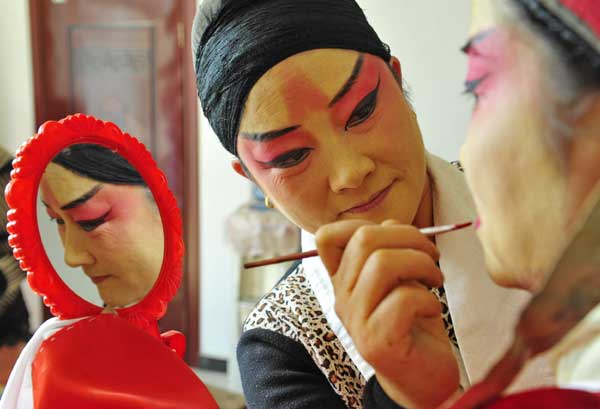 |
|
Chinese opera performers put on makeup. Photo provided to China Daily |
6-year apprenticeship
As with other genres such as Peking Opera, performers in Hebei Bangzi Opera must practice for years to perfect the necessary skills.
Cui Xiubin, leader of the Hebei Bangzi Opera troupe in Pingshan county in the provincial capital, Shijiazhuang, said, "It usually takes a young person at least six years before they are able to sing on stage."
Performers only start to earn money when they appear on stage-they receive nothing during their years as apprentices apart from free meals.
Many young people would rather work on construction sites than learn to appear in local opera "because it's too tiring to practice and the money is too little to support a family," Cui said. He added that no one applied to join his troupe as an apprentice in 2014.
The Zhengding troupe persuaded only three people to stay out of more than 100 apprentices it taught since the 1980s.
The number of students taking training courses offered by the province's colleges has fallen sharply in recent years.
Hebei Vocational Art College, the only school with a major in Hebei Bangzi Opera, is proud of the quality of its students. Out of 80 who took the major, 80 percent continued their studies in higher universities such as the National Academy of Chinese Theater Arts.
Peng Huiheng, a teacher at the college, said, "Sadly they changed their majors from Hebei Bangzi Opera to other operas in their higher studies. There are fewer and fewer professional singers for our local opera."
In addition to the long training and exacting standards, the low rates of pay offered by troupes is another factor that drives young people away. County troupes offer monthly salaries of around 2,000 yuan. Many singers move from local troupes to private companies, or switch to other careers.
Zhang Fanghua, the retired actress in Zhengding, said, "It's a pity to lose experienced singers."
Yao Baowu, the manager of the Xiangyuanqing Company, which runs a private Hebei Bangzi Opera troupe in Beijing, said he has lured performers from county and city troupes by offering higher pay of around 4,500 yuan a month.
"Private troupes have better stage sets and costumes, and this helps them to attract audiences and make more money," Yao said.
Unlike private troupes, the county troupes are affiliated to governments and receive subsidies from them.
However, many say the limited funding they get makes it difficult for them to replace costumes and other items. The Zhengding troupe receives 100,000 yuan a year, barely enough to cover salaries, and this leaves little for other items.
Jia, the researcher, said the arts industry has been reformed in the province over the past 10 years. This has led to many of the public troupes being encouraged to cut their bonds with governments and make their own way in the market.
"However, these troupes find it hard to establish a new position, and local opera has attracted smaller audiences in recent years," Jia said.
Most of the troupes perform in villages where it is difficult to make much money, he added.